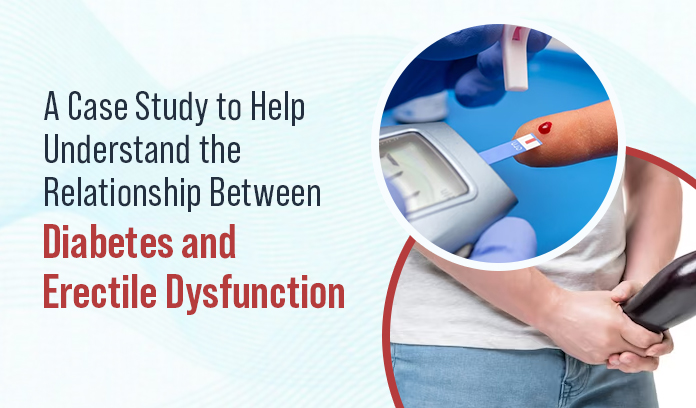Case Presentation
Patient Profile: Philip, a 54-year-old man, presented to the clinic complaining of recurrent difficulty in getting and maintaining an erection over the past year. Five years ago, he was diagnosed with type 2 diabetes mellitus, and since then, he has been managing his condition with medicine and lifestyle changes.
Symptoms: Philip reported a gradual worsening of his erectile function. Despite having a strong desire to engage in sexual activity, he experienced a diminishing quality of his erections, leading to feeling embarrassed, frustrated, and anxious.
Medical History: Apart from type 2 diabetes, Philip had no significant other medical history, and he was not taking any medications that could have potentially caused erectile dysfunction.
Discussion
Diabetes and ED are closely linked due to various physiological mechanisms. Several reasons for the development of erectile dysfunction in diabetic patients can be identified as below:
- Neurological Damage: A condition known as diabetic neuropathy, a nerve damage can result from prolonged exposure to high blood sugar levels in diabetic patients. This condition can affect the nerves responsible for initiating and maintaining an erection.
- Vascular Complications: Diabetes is associated with the development of atherosclerosis, narrowing, and hardening of blood vessels. This can restrict blood flow to the penis, impeding the ability to achieve and maintain an erection.
- Hormonal Imbalance: Diabetes can disturb the delicate balance of hormones in the body, including testosterone, which is an essential hormone for normal sexual function. Low testosterone levels are often observed in diabetic men with ED.
- Psychological Factors: The emotional burden of managing diabetes can lead to stress, anxiety, and even depression, which are known factors contributing to erectile dysfunction.
Treatment and Management
Philip’s treatment plan included a comprehensive approach to address both his diabetes and erectile dysfunction:
- Diabetes Management: Philip’s diabetes medications were studied and his blood glucose levels were optimized. Lifestyle changes, including a balanced diet and regular physical activity, were encouraged to improve his overall diabetes control.
- Medications for ED: Oral medications such as sildenafil (Viagra) were prescribed to him to enhance blood flow to the penile area and facilitate erections. Lifestyle changes, including reduced alcohol intake and quitting smoking, were also recommended.
- Psychological Support: Philip was referred to a therapist to address the emotional distress associated with his condition. Cognitive-behavioral therapy (CBT) was initiated to help him manage stress and anxiety.
Conclusion
This case study explains the importance of a holistic approach that considers the interplay of medical, psychological, and lifestyle factors in managing diabetes-related ED. Through such an approach, patients can regain confidence in their sexual function and overall health.

